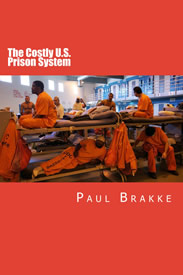FOR IMMEDIATE RELEASE
In many prisons, inmates now have a chance to get a GED (General Equivalency Diploma) or high school diploma, and these programs are strongly praised by criminal justice expert, Paul Brakke, who has written and published seven books on the subject through American Leadership Books. His latest books which focus on or have chapters on prison conditions are Crime in America and The Costly U.S. Prison System.

As Brakke points out, about 70% of all inmates never graduated from high school, but these programs give them a chance to get either a GED or high school school. Having this degree plays a major part in getting hired for a job and opens the door to further education and better jobs and business opportunities in the future.
As an example of these successful programs, Brakke points to the Lockhart Correctional Facility, a minimum-security women’s prison in Central Texas. The prison has one of the high school programs in Texas prisons. After the inmates leave prison, teachers at the prison help the ex-cons find jobs.
According to Brakke, these programs help reduce costs of imprisonment and recidivism, contribute to a reduction in crime, and strengthen families by helping prisoners get the skills they need to better get a job when they come out. As a result, they are less apt to return to crime. A reason these programs are so valuable is that about 70% of American prisoners have not completed high school, though they need that diploma to get many jobs or pursue a higher education.
“Minimally,” Brakke says, “they should get a GED, which is equivalent to a high school diploma, although not equal, since it only teaches prisoners the basic reading, comprehension, writing, and math skills. It doesn’t offer classes on specific subjects, such as history or geography, so the prisoner who gets a GED doesn’t learn all of the subjects someone would take in a regular high school. At least it helps in getting a job upon release, and it opens the door to getting a higher education after prison.”
As Brakke states, “Getting this education is really important for prisoners who haven’t graduated from high school, since education offers an opportunity for social and economic mobility after release from prison.
This education also saves the state and nation a huge pot of money, because most of these ex-cons go straight when they leave with a degree that helps them get a job and reconnect with their family. Then, they have much less incentive to return to crime once they are working again.”
To provide an example of this cost savings, Brakke cites what the state of Maryland spends on education and incarceration. “It costs around $12,000 per year per public school student from K-12. But the state spends around $37,000 a year for each person they incarcerate – about three times as much. Just think how much the state could save by putting this money into helping prisoners get a high school or GED degree, so there would be fewer incarcerated individuals, due to less recidivism as a result of less crime.”
Thus, as Brakke points out, providing a GED or high school education for those who don’t have it, makes economic sense. For instance, a 2016 RAND Corporation study found that individuals who participated in any kind of educational program while in prison were 43% less likely to return to prison. Plus other research has consistently shown the benefits of getting an education in prison — among them an increased personal income, lower unemployment, greater political involvement and volunteerism, and better health.
“The big reason for these differences is being better able to get a job after prison,” says Brakke. “Ex-cons with a limited education often find they don’t have financial resources or a social support system after they get out of prison. So they are more likely to commit a criminal act rather than becoming reintegrated into their community. The financial numbers show the need for this high school GED education even more, since taxpayers will generally save four to five dollars that Would be spent on incarceration for every dollar they spend on prison education, according to a March 2018 article on “Educating Opportunities in Prison Are the Key to Reducing Crime” published by the Center for American Progress.”
Finally, another perk is that since ex-cons are more likely to be employed, they pay more in taxes and have more purchasing power, and by becoming more self-sufficient citizens, they are less reliant on government programs. “So it’s a win-win for both the individual and society,” says Brakke. “For example, Missouri saved approximately $25,000 per year for every incarcerated individual who didn’t return to prison. Thus, if a high school diploma or GED can help to keep released inmates from returning to prison, let’s go for it. Let’s provide the funding to make these programs happen.”
Brakke brings to his advocacy for high school and GED programs in prisons an extensive background in criminal justice research. He has now written seven books on criminal justice topics, which include most recently Crime in America and the soon to be released Prisons in America. In writing these books and working as a consultant, Brakke brings to the table a unique conservative approach to crime and criminal justice. That’s because usually liberals discuss ways to reform the system through more of a social welfare approach. But Brakke’s approach is based on an economic business model of doing what works most efficiently to both cut down costs and create more productive citizens.
Since publishing Crime in America, Brakke had 35 videos made featuring highlights from the book which are available on the American Leadership Books YouTube channel at https://www.youtube.com/channel/UCfHgXXiW3jgODnaypgcYZFw
To learn more, you can get a copy of Crime in America, which is now available through Amazon, Kindle, and major bookstores. It is currently available on Kindle at reduced price during its special KDP Select Promotion at https://www.amazon.com/Crime-America-Conservatives-Approaches-Criminals-ebook/dp/B07MKZG84Z.
Also, free copies are available for government officials who are seeking ways to reduce crime and fix the criminal justice system and for members of the media at https://crimeinamericathebook.com
For media copies of the book, more information on American Leadership Books and Paul Brakke, and to set up interviews, please contact:




